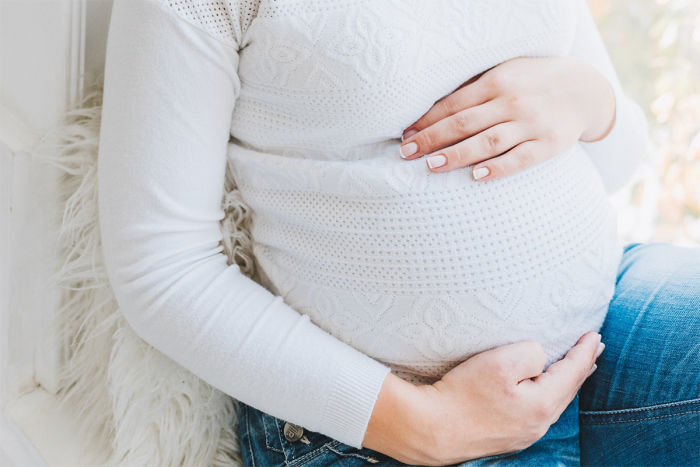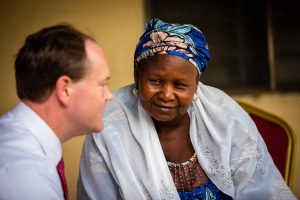Former Pfizer VP urges pregnant, childbearing age women not to get COVID vaccine; CDC disagrees

A former Pfizer executive recently advised that women of childbearing age and those who are already pregnant should consider opting out of taking the COVID-19 vaccine, but the Centers for Disease Control and Prevention said this week that the vaccines are safe and don't show an increased risk of miscarriage.
On Wednesday, the CDC advised pregnant women to get the COVID-19 vaccine, stating that it found no increased risk of miscarriages among those who've been vaccinated.
While the CDC's guidelines have advised that pregnant women get the vaccine to help protect against the possible risk for severe illness or adverse pregnancy outcomes, stating it was “unlikely to pose a risk for people who are pregnant,” it previously added that there was "limited data on the safety of COVID-19 vaccines in pregnant people.”
It adds that because the vaccines haven't been studied on mothers who are breastfeeding, "there are limited data available on the safety of COVID-19 vaccines in people who are breastfeeding, effects of vaccination on the breastfed baby," and "effects on milk production or excretion.
The CDC's updated guidelines added: "Recent reports have shown that breastfeeding people who have received mRNA COVID-19 vaccines have antibodies in their breastmilk, which could help protect their babies. More data are needed to determine what protection these antibodies may provide to the baby."
Last Wednesday, Michael Yeadon, who served as vice president and chief scientist for allergy and respiratory at Pfizer until 2011, raised some concerns about the COVID-19 vaccines use on pregnant and childbearing age women during Life Site News’ “Stop the Shot” conference, where he was one of the speakers.
“We never, ever give experimental medicines to pregnant women," said Yeadon, Ph.D., in a presentation.
Yeadon, who holds degrees in biochemistry, toxicology, and a Ph.D. in respiratory pharmacology, launched his own biotech company after working in the pharmaceutical industry for 32 years. Since the novel coronavirus outbreak, he's attracted some media attention and criticism for questioning the safety of COVID-19 vaccines.
He argued that pregnant women who've been told that the COVID-19 vaccines are safe for them and their preborn babies have been "lied to."
“That’s bad enough because what that tells me is that there’s recklessness. No one cares. The authorities do not care what happens,” Yeadon asserted.
“You never, ever give inadequately tested medicines, medicinal products, to a pregnant woman,” he continued. “And that is exactly what is happening. Our government is urging pregnant women, and women of childbearing age, to get vaccinated. And they’re telling them they’re safe. And that’s a lie because those studies have simply not been done.”
Since data show that only some 22% of pregnant women have received one or more doses of the COVID-19 vaccine, the American College of Obstetricians and Gynecologists and the Society for Maternal-Fetal Medicine are among the organizations that have also urged women to get vaccinated.
"Data have shown that COVID-19 infection puts pregnant people at increased risk of severe complications and even death," the organizations asserted in a joint statement.
“COVID-19 vaccination is the best method to reduce maternal and fetal complications of COVID-19 infection among pregnant people,” added Dr. William Grobman, president of the Society for Maternal-Fetal Medicine.
Dr. J. Martin Tucker, president of ACOG, added the group “encourages its members to enthusiastically recommend vaccination to their patients."
Yeadon, however, also contended during his presentation that the COVID-19 vaccines haven't undergone adequate toxicology testing to assess their effects on the reproductive system.
As an example of why he's raising questions about the safety of the vaccines for pregnant and childbearing age women, he noted the thousands of birth malformations resulted from pregnant women taking thalidomide to treat morning sickness 60 years ago. At the time, he said, studies did not assess that thalidomide was toxic for babies in the womb.
“So here we are. There’s been potentially hundreds of millions of women of child-bearing potential [injected] with products which are untested in terms of impacts on fertilization and development of the baby,” he continued.
Yeadon added that one study out of Japan found high concentrations of the spike protein in the ovaries, organs and tissue when tested on rats.
“What we find is the vaccine [in rats] doesn’t just distribute around the body and then wash out again, which is what you’d hope,” he said. “It concentrates in ovaries of rats, and it concentrates at least 20-fold over the concentration in other background tissues like muscles.”
“You don’t want this product in your ovaries. It’s simply not necessary to induce immunity to have a vaccine in your ovaries. And, as it’s concentrating in the ovaries, getting higher concentrations over time, they have not even defined what the maximum levels are or when that occurs,” he added.
“And I will tell you, a general rule of thumb in toxicology is, if you don’t have any data to contradict what you’ve learned, that’s the assumption you make for humans. So my assumption at the moment is that is what is happening to every female who’s been given these vaccines. These vaccines are concentrating in her ovaries,” he said.
Yeadon concluded his presentation by directing a message to women of childbearing age and younger: “I would strongly recommend you do not accept these vaccines.”
CDC Director Rochelle Walensky, however, stressed the urgency for women to get vaccinated, assuring them that the vaccines are safe.
In a statement released Wednesday, Walensky said: “CDC encourages all pregnant people or people who are thinking about becoming pregnant and those breastfeeding to get vaccinated to protect themselves from COVID-19. The vaccines are safe and effective, and it has never been more urgent to increase vaccinations as we face the highly transmissible Delta variant and see severe outcomes from COVID-19 among unvaccinated pregnant people.”
Though the CDC's advice pertains to all COVID-19 vaccines, an official told The Washington Post that "the one-shot Johnson & Johnson version has not been studied as much as the versions produced by Pfizer-BioNTech and Moderna."





























